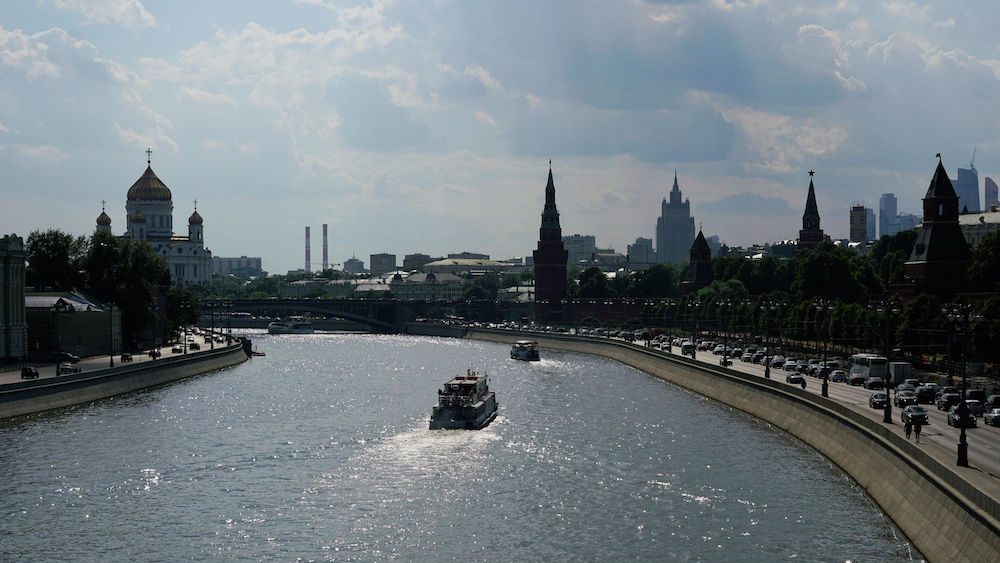The Russian capital has become more hip, its post-Communist ennui replaced by fashionable new urban development. But this only serves as a distraction from Russia’s political problems – some of which are keeping Muscovites trapped at home.
Moscow is looking better than it has in decades.
When I first visited the city 25 years ago, it was the decaying capital of world communism. A decade later, during an unprecedented oil boom, Moscow had become a jungle of runaway real estate developments and monster traffic jams. Today the city is undergoing yet another transformation.
Returning to see friends this summer, I barely recognized the place. In the city’s historic center, bicycle lanes and broad granite sidewalks now squeeze out cars. Parking rules are strictly enforced, and outdoor advertising has largely vanished.
The changes are not only cosmetic. Gourmet burger joints, kosher restaurants, and craft beer pubs vie for the foot traffic. As a friend and I sat on one of the ubiquitous summer verandas one evening, quaint trams trundled by.
Of course, Moscow’s incredible urban revival has its critics. Opposition politicians grumble that it’s a ploy to win over Moscow voters before parliamentary elections in September. Drivers complain that it’s even harder to get around. And small-time entrepreneurs are distraught that their street kiosks have been leveled in the name of beautification.
At the same time, it’s hard to find anybody who would deny that Moscow has become a more livable metropolis. Even as it continues to curtail Russians’ freedoms, the Kremlin is keeping open a safety valve for its most demanding and active citizens. President Vladimir Putin can’t forget the wave of anti-government protests that broke out five years ago, when tens of thousands of middle-class Muscovites took to the streets. The main job of Moscow mayor Sergei Sobyanin, a Putin loyalist, is to keep them from doing it again.
“Cognitive dissonance” was how one Russian friend described Moscow’s facelift. Like Dorian Gray, the Russian capital is putting on an attractive public face while the political regime ossifies behind the Kremlin walls.
On the flight to Moscow, I was amazed to read a newspaper exposé detailing shady customs schemes on the Finnish-Russian border. After landing, I found out that investigators had just searched the home of Andrei Belyaninov, the chief of the Federal Customs Service, finding shoeboxes filled with cash and valuable paintings. Two days later, the Russian president sacked seven regional leaders.
“Servants, Not Friends”
As the economy limps along, the competition for scarce resources is increasing among Russia’s ruling class, Stanislav Belkovsky, an acquaintance and political analyst, told me over brunch. “Putin wants servants, not friends,” Belkovsky said. “The firings aren’t political but psychological. He’s getting tired of his friends.”
Does that make people at the top unhappy? “Yes,” Belkovsky replied. “But it’s unclear what that dissatisfaction will turn into.”
Palace intrigue is a topic that most Russians would rather avoid. Instead, creative minds in Moscow are turning to abandoned industrial spaces to open art galleries and bike shops. I met a former investment banker who now sells custom-tailored shirts in an old chocolate factory. As the plunging ruble renders trips to Western Europe and the United States unaffordable, Moscow’s young globetrotters are creating havens for themselves at home.
Journalists are finding it difficult to work in the current political climate. I know a dozen Russian colleagues who have moved away in the past five years, and during my visit, one old friend was packing up to emigrate to Canada with his family. Among other concerns, the space for investigative and critical reporting is getting narrower: One colleague told me that newsmakers are increasingly reluctant to give interviews, and that more decisions are being made behind closed doors.
Putin is still very interested in Ukraine, said a friend who works for one of the last independent broadcasters in Russia. “I’m afraid there is going to be war. It’s unfinished business that has to be finished,” he said. “He’ll definitely return to Ukraine militarily. He won’t leave it alone.”
That’s not to say that all my friends in Moscow were overcome by doom and gloom, even if nobody was overjoyed about the current state of affairs. One acquaintance, a rising star in a large state company, told me defiantly that he’s happy to hold Russian citizenship because it’s one of the hardest nationalities to come by, especially compared with US or German citizenship. At the same time, he said, he can easily get a visa for anywhere while living and working in his native country.
Another friend, who works for the Eurasian Economic Union, Putin’s rival to the EU, mocked Western fears of an aggressive Russia and blamed the United States for sowing strife. “With the exception of the Baltics, are the former Soviet republics really better off now than before independence?” she asked. “Wouldn’t it be better to be together again?”
I took her question to be rhetorical and moved on. It was a warm summer evening on a veranda, and the trams reminded me of Prague.







